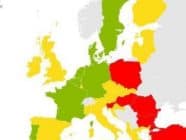British press coverage of Europe is often superficial, one-sided, and eurosceptic, according to academics and journalists speaking at a recent conference on Britain’s place in the EU.
Speakers at the inaugural Britain in Europe conference at the University of Bedfordshire, said reporting on the EU and its institutions was often selective. Many journalists focus on how British politicians react to Europe, rather than on how the work of the EU impacts British politics and society. Reporting may have improved since the 1990s, when The Sun newspaper published its classic “Up Yours Delors” headline, but not by much.
Cristina Marconi, a former Brussels correspondent and co-author of a recent Reuters Institute for the Study of Journalism report, Reporting the EU, questioned whether it was possible for journalists to be objective when covering Europe. She argued that many Brussels correspondents saw the EU through the prism of nationhood.
Paola Buonadonna, of British Influence, a pro-EU think tank, said the EU has changed considerably since the 1990s, yet the transformation had not been adequately conveyed to the European public by the media.
The BBC’s EU coverage was also scrutinised. Dr Mike Berry of Cardiff University, who conducted a 2013 content analysis of how the BBC covers the EU, commissioned by the BBC Trust, said the broadcaster focussed more on political infighting within the two major parties than on broader issues. He found that the multiplicity of ways in which the EU impacts Britain was largely absent from coverage; and that Eurosceptic views tended to be featured far more heavily than those arguing for the benefits of EU membership.
Other speakers criticised the general quality and paucity of EU coverage in the UK.
Speakers from politics, journalism and think tanks, also debated the legal, economic and political consequences of a British exit from the EU, known as BREXIT.
Keynote speaker, David Charter, Berlin correspondent for The Times, offered a forensic economic analysis, regarding whether Britain would be better or worse off in or out of the EU.
Lord Roger Liddle, former special advisor on Europe to Tony Blair, presented his keynote speech alongside Bill Rammell, the Vice Chancellor of the University of Bedfordshire, an ex-Foreign Office minister and former chair of the Labour party’s Britain in Europe Group.
British exceptionalism – and how that is now coupled with a wider Euroscepticism elsewhere, was debated by Dr Chris Gifford, from the University of Huddersfield. Professor Stephan Russ-Mohl of the Universita della Svizzera Italiana, discussed the lack of a European public sphere, including within the media landscape.
Dr Paul Rowinski, senior lecturer in journalism and conference organiser argued: “The consequences of BREXIT would be profound for both the UK and indeed the rest of Europe. The press in this country have not had a serious discussion about those consequences, restricting most discourse not to what Europe is about but instead how British politicians are fighting over it.
“And the implications of that exit and what the EU does? That discussion is only starting now. It should have been had decades ago.”
Rowinski said the conference, which took place in April, would become a regular annual event.
pic credit: Flickr Creative Commons, Duncan Hull
Tags: BREXIT, Eu, Europe, European Union, Journalism, Reporting the EU, University of Bedfordshire













































